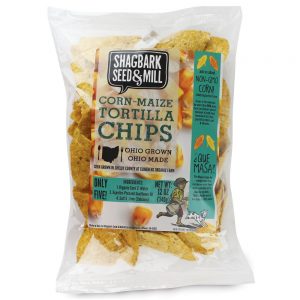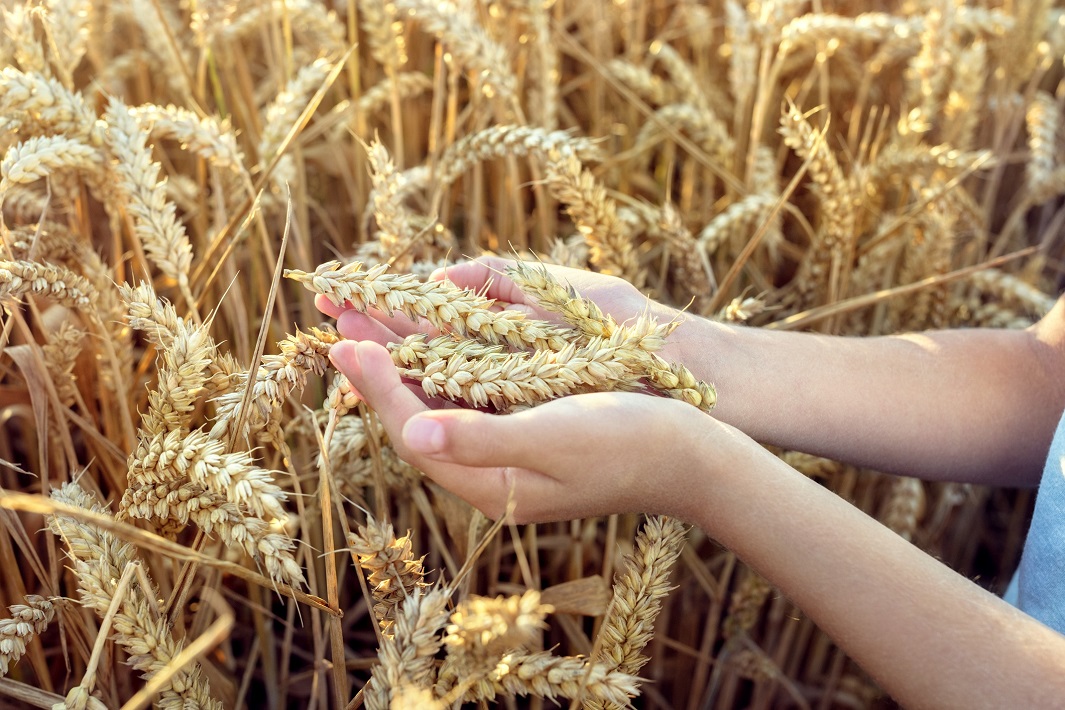In 2007, Michelle Ajamian and Brandon Jaeger saw a big gap in the local food movement. There were no locally supplied grains and beans at farmers markets in Ohio.
“We wondered: why are grains and beans not part of the burgeoning local foods movement?” Ajamian asked.
This question eventually led Ajamian and Jaeger to launch Shagbark Seed & Mill, a milling and seed cleaning business in Athens, Ohio. Shagbark’s focus is local and regional, supplying tortilla chips, cereals, popcorn, flour, pasta, whole beans, and other milled products. Most of the products are organic.
“We started Shagbark to be a model of how to supply regional grains,” Ajamian says. “Everything we have is Ohio grown and Ohio made.”
Local mills virtually disappeared
Shagbark Seed & Mill represents a revival of a time-honored tradition, local grain milling. In the past few decades local grain mills, which were common in rural communities, have virtually disappeared.
“Every town in the United States had a Mill Road or a Mill Creek because there were mills everywhere,” Ajamian says.
The milling of grains is now dominated by large multinational corporations like Cargill and ADM. The disappearance of local mills and midsized farms led to the decline of rural towns throughout the Midwest. Commodity and genetically engineered grains such as wheat and corn wheat are bred for yield instead of nutrition, which have created poor quality processed food and, in turn, poor health for many Americans.
“We wanted to do something about that,” Ajamian said.
Ajamian and Jaeger launched Shagbark Seed & Mill in 2010 after testing the market for local grains and beans and seeing strong demand.

Shagbark Seed & Mill’s Tortilla Chips made from non-GMO corn are a top seller.
Today, Shagbark Seed & Mill is growing fast. Their products are sold or served at many locations in Ohio, including restaurants, supermarkets, natural food stores, breweries, universities, and hotels, among others. Their tortilla chips are sold in Whole Foods stores in seven states in the Mid-Atlantic region.
But the main focus remains Ohio. “Our brand is really about local, regional, and organic,” Ajamian says. “We never get crops from anywhere else unless one of the local farmers has run out of crop.”
They buy grains from eight farmers, all within 150 miles of the mill. Hershberger Family Farm in Morgan County grows heirloom popcorn. Clinehens Organic in Shelby County grows corn used to make masa, tortillas, tortilla chips, and crackers. Andrews Organics in Defiance County grows black and pinto beans. Other farmer partners grow fife wheat, spelt, and heirloom buckwheat.
All the farmers are listed on Shagbark’s website as well as on the packaging of products made from their crops.
“Part of our goal is to create markets for farmers who are doing it right,” Ajamian says. “Farmers don’t have time to do markets. So that’s our job. We’ve developed a brand that people associate with Ohio organic farmers.”
Building a national network of local grains and milling
Shagbark Seed & Mill is part of a growing national movement of local grain production and milling. Ajamian wants to help build a national network of such businesses.

Michelle Ajamian, co-owner of Shagbark Seed & Mill

Brandon Jaeger, co-owner of Shagbark Seed & Mill
“This national network idea is to identify pockets of folks who are doing more localized grain and bean work and help them connect with one another to get resources, and things like that,” she says.
Such a network is needed to change the current food system from the industrial/commodity model to one based on locally produced and organic grains.
Ajamian estimates there were only five local milling groups in the U.S. when she and Jaeger first started Shagbark Seed & Mill. Now, there are more than 100.
There are Greenmarkets Regional Grains Project in the Northeast, Northern Grain Growers Association in Vermont, Maine Grain Alliance, Common Grain Alliance in Virginia, Noble Grain Alliance in Colorado, and California Grain Campaign, to name a few.
Maine Grain Alliance was founded in 2007 to help build Maine’s grain economy, according to executive director and grain farmer Tristan Noyes.
“We asked: what can we do to stimulate our farming history? What is missing in our local food economy?” he says.
Noyes says Maine’s grain economy had all but died out. “In the mid-1800s to 1900s there were thousands of small mills for food and feed purposes. But over time those mills closed,” he says.
Today, artisan bakers have revived that economy. “Farmers are growing grains to support the qualities bakers are looking for,” he says.
Like Ajamian, Noyes sees grains as missing in the local food movement.
“Grain is the last to enter in the locavore movement,” he says. “It’s easy to imagine a tomato growing in a garden but it’s harder to understand how grain is grown, cleaned, de-hulled and milled into flour. It’s our mission to help educate people.”
In California, Nan Kohler is owner and miller at Grist & Toll, a stone miller in Pasadena. She is also with California Grain Campaign, a group of farmers, millers, and bakers promoting California whole grain and milled products.
“We are growing, milling, and baking as much California wheat as we can,” Kohler says.
Her group wants to organize sustainable grain hubs using grains grown in California such as wheat, rye, spelt, einkorn, and land race wheat.
“Our position is that wheat is a significant part of California agriculture and needs support,” Kohler says.
Like Ajamian and Noyes, Kohler sees local grain production and processing as a healthier, more sustainable, and economically viable alternative to industrial, commodity grain production.
“We need to change wheat, the type of wheat, how it is harvested and how it is turned into something we eat. Our food can be so much more delicious by changing this process. Whole grain flour provides another world of flavor, character, and creativity,” she says.
Developing new organic wheat and barley varieties for farmers and millers is the mission of the Bread Lab at Washington State University, led by Dr. Stephen Jones, a leading wheat breeder. The Bread Lab is helping to build a vibrant regional economy in Washington based on hardy, nutritionally-dense rotation crops that are favored by local millers and malt makers who sell to regional bakers and brewers. Two hundred new jobs have been created in recent years by the intersection of the Bread Lab, farmers and related businesses.
“The Bread Lab strives to keep the value derived from agriculture in the region where it’s produced,” Jones says. “As plant breeders, we make grain varieties that work for the farmer first, and then find their best use regionally for milling, baking, brewing, and other uses.”
At Shagbark Seed & Mill, Ajamian sees local grains and milling as an idea whose time has come.
“We are busy all the time, so I guess that’s a good indicator. There is a big market out there for products of local grains. It’s really wonderful.”





